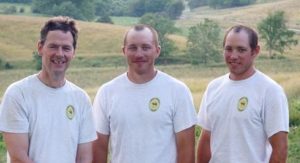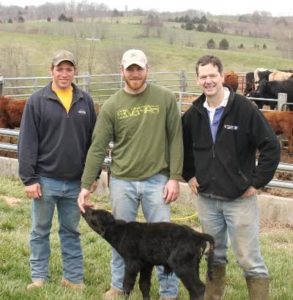When did you start farming?
We three have slightly different backgrounds. Andrew and Jacob have been farming for about as long as they have been able to stand up! Bryan is late to the work and he started when the team assembled in 2011 to begin our joint work as Three Spring Farms.
What is your background? How long have you worked on the farm?
Andrew and Jacob grew up on a family farm in Perry County, Missouri and have been participating in that life and work for as long as they can recall. Both have studied agriculture at the University of Missouri and carry on as the 4th generation of family farmers in the region. Bryan had a brief exposure to farming years ago as a student in central Illinois, and now returns to it as a partner with the Bachmann brothers. We have been working together since the inception of Three Spring Farms in 2011.
Why is local food important?
Local food is important to the consumers because they are buying from the producers of the food, not middlemen, and they are directly supporting the agricultural community by doing so. Local food is fresher and has traveled fewer miles to get to the plate. The money of the end consumers stays around longer too- we get paid and then we buy fencing from Muellers down the road or have our well repaired or our septic system rehabbed by local craftsmen. When the money leaves the community, it is gone, but when locals lean on each other, those dollars circulate and provide benefit over and over again.
How do you define ‘sustainable’?
Philosophically and theoretically, we think sustainable describes farming processes that could go on indefinitely without injuring the land, injuring the environment or impoverishing the producer. Practically, we are raising meat, eggs and vegetables without pesticides, hormones, antibiotics or other expensive inputs from off the farm. By practicing a “pasture-based” program, we are building soil rather than depleting it and we are leaving the farms cleaner and better as we use and repair them. Grassfed animal husbandry builds the carbon stores in the soil and converts sunlight to food energy. That is sustainable!
What do you wish people knew about the food system in St. Louis?
We wish more people knew about the various methods to meet and purchase directly from producers from Missouri and Illinois. We take part in two farmers markets (Kirkwood and Tower Grove) and these activities take a lot of time and expense to get to and to be a part of. If more people made such markets a stop on their weekly routine, it would make the markets stronger and a positive feedback loop would make the market experience increasingly varied and valuable to the shopper.
Why is it important for people to know where their food comes from?
Because the food shopper has a lot of power with her choices about the way those food dollars are spent. It makes sense that influential consumers who have the power to “make or break” small businesses of food producers would spend some time to learn about the options and know more about their food suppliers. It is an important responsibility that is worthy of some time and effort to learn more.
What has been your greatest struggle as a small farmer in the food industry?
It has been a terrific challenge to match supply to demand when both are frustratingly unpredictable and “lumpy”. We have been offered the opportunity to provide one particular steak in large quantities to one restaurant, only to learn that to meet their high demand we would have to butcher a year’s worth of cattle in one months, for only that one specific steak! We have to sell and use the whole animal, but individual buyers may have use for only one particular element. By the same token, it hurts to have too much of a good thing when the crops are coming in and we get left with unsold food on hand. We have come to love and appreciate the flexible shopper, the one who asks: “what have you got that is good today?”
How do you sell your products… do you sell to restaurants, CSA, farmers market or grocery stores? Why did you choose this distribution method?
We continue to experiment with different methods in order to be resilient and nimble with distribution. Our complicated and unintentional distribution method includes the following: direct to consumer in bulk, direct to consumer at Farmers Markets, via Local Harvest Grocery in Tower Grove South neighborhood and in any other way we can find to meet people who appreciate out products. We recently got a shot with Mac’s Local Buys in Dogtown, which is an established buyer with many customers who allow “Mac” to do the legwork for them on great local foods. We have periodic cameo appearances in the Local Harvest CSA, too. It has not been an organized plan of distribution but a relentless search for leads and opportunities to meet more folks who like local and personal food.
How do you see your role in the community?
The farmer or producer has many roles. We supply some of the food for our customers, but we try also to educate them about the food and the food production. We hope to entertain them with stories. We can be a catalyst of memories for those who grew up on a farm or had parents who did so. We may seem like a luxury at times, with cheap supermarket food available, but the knowledge and skills that farm people like Andrew and Jacob have are a community asset worth preserving.
What changes have you seen in the farming industry throughout your lifetime?
It is hard to answer for a lifetime. There is an old joke in Maine in which a tourist asks a grizzled old-time if he had lived in Maine for his whole life. The old-timer pauses, looks at the tourist and says: “not yet”. The most important changes in the last few years have been the local food movement and the support/celebration of the producers in the form of Farmers Markets and Community Sponsored Agriculture programs. These have been hugely important and we hope they continue to grow. Certainly, there are more people vying for attention in these venues, too, so it is not easy to grab market share, but with hard work and good communication skills we think a small farmer can find and hold onto a customer base.
What is your favorite growing season/crop?
The perennials such as blackberry, asparagus and fruit trees are nice in that you don’t need to start from scratch each year to get a crop. Even though they do require annual care to produce, it still feels a little like you are getting something for nothing when the new crop appears year after year. This spring we planted 18 heirloom apple trees to get more of that same feeling in the future! Who doesn’t like a little something for nothing every now and then!
Check out Three Springs Farm’s Website!


